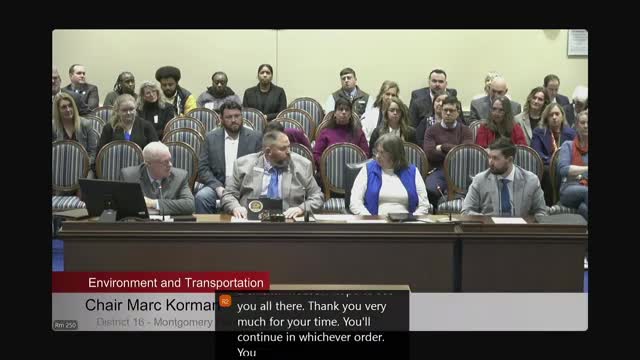Maryland grain farmers and Farm Credit warn of tight margins, supply disruptions and labor pressures
Get AI-powered insights, summaries, and transcripts
Subscribe
Summary
Representatives of Horizon Farm Credit and the Maryland Grain Producers Association told the House Environment and Transportation Committee on Jan. 28 that Maryland grain farmers faced a difficult 2024 and remain under pressure as 2025 begins.
Representatives of Horizon Farm Credit and the Maryland Grain Producers Association told the House Environment and Transportation Committee on Jan. 28 that Maryland grain farmers faced a difficult 2024 and remain under pressure as 2025 begins.
"Despite high interest rates, stubborn input costs, and softening commodity markets, we remain bullish on the long term prospects for Maryland agriculture," said Tyler Marcek, government affairs manager for Horizon Farm Credit, while also listing recent stresses that damaged returns.
Marcek described widespread weather damage and lower yields for corn, soybeans and wheat in 2024 and said many grain farmers did not break even. "Overall, in 2024, if you broke even as a grain farmer, you had a good year," he said. He said farm lenders encountered customers worried about paying expenses incurred in 2024.
Justin Bridal, president of the Maryland Grain Producers Association, told committee members that farmers still see important local markets — notably the poultry sector on Delmarva, which purchases most Maryland corn and soybeans — but that commodity prices and input cost spikes have driven net farm incomes down. "Farmers are the smallest minority that impacts every American multiple times a day," Bridal said.
Speakers detailed supply-chain disruptions that affected nutrient availability and equipment access, including a major bridge loss and a temporary closure of the Port of Baltimore that disrupted fertilizer deliveries and imports of farm equipment. "The Port Of Baltimore is also a major hub for us for importing agricultural equipment and goods," Bridal said, thanking state officials for efforts to reopen the port and plan a new bridge.
On labor, panelists said the H-2A guest-worker program is increasingly necessary for specialty crop harvests and other seasonal work. A fruit-and-vegetable producer on the panel said the number of H-2A workers in Maryland has risen from roughly 500–600 five years ago to an estimated 1,500 this season; that increase was described as a ground-level estimate by a panelist involved in housing inspections.
Speakers emphasized conservation and technical assistance as part of the response to economic stress. Marcek noted that farm lenders offer member assistance programs for mental-health and financial counseling. Bridal and other panelists credited the state cover crop program for making some conservation investments feasible; Bridal said record cover crop acreage was planted in fall 2024 and that cover-crop payments make practices financially possible.
No committee votes or formal directives followed the briefing. Panelists answered questions from delegates about markets and profitability but did not propose specific new legislation in this session.
